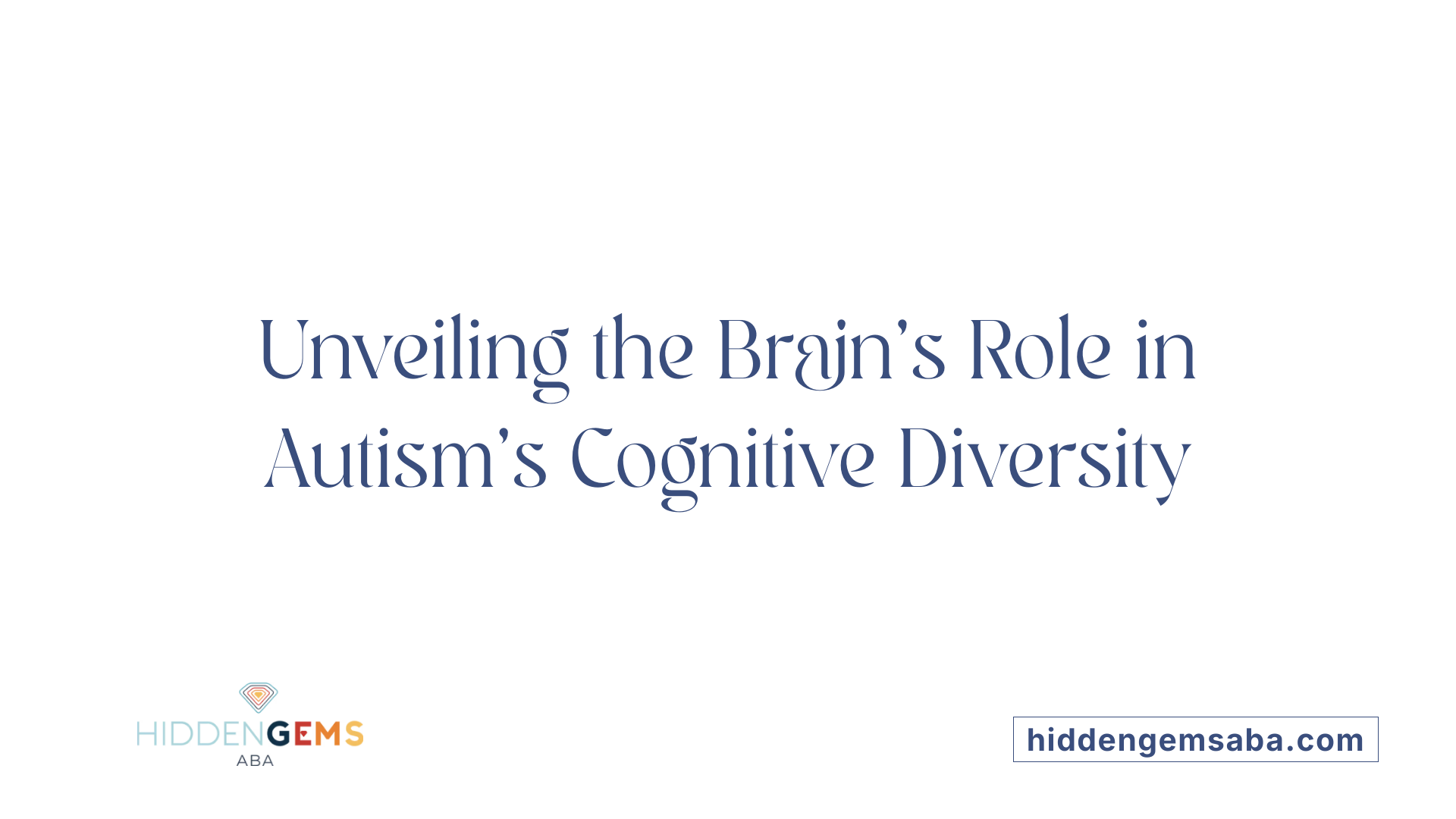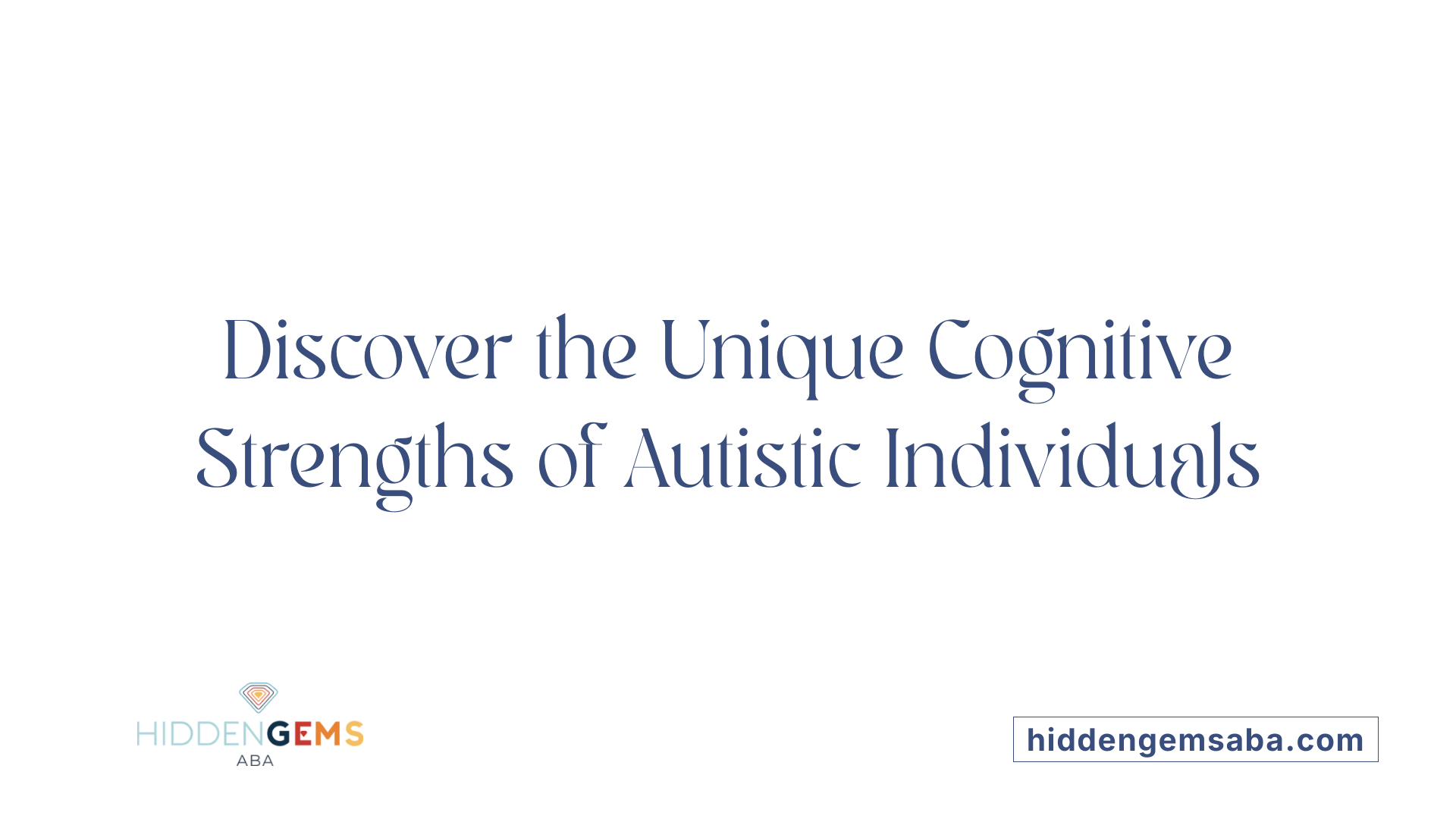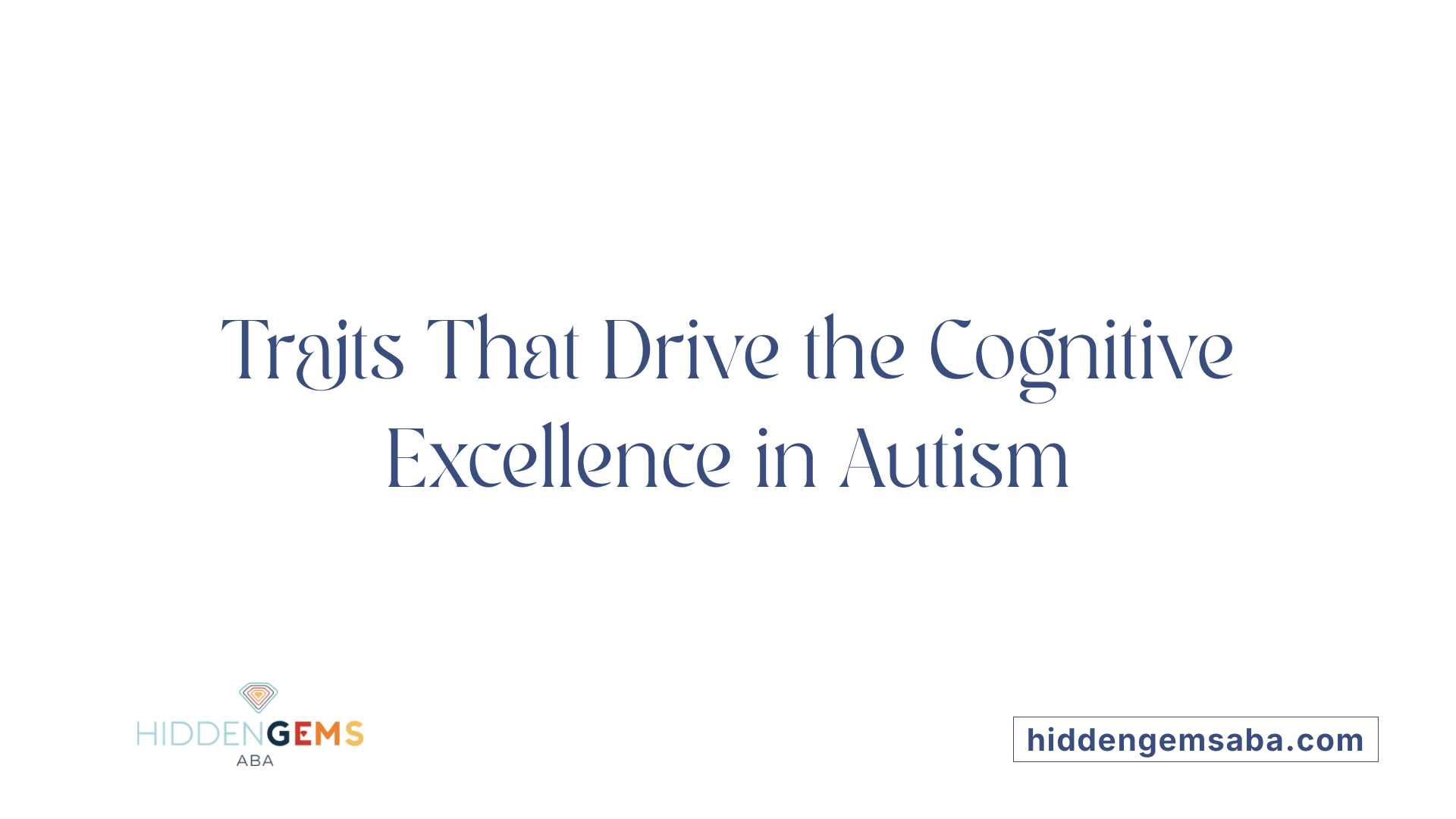Exploring the Connection Between Autism and Exceptional Intelligence
Autism Spectrum Disorder (ASD) is often misunderstood, with many focusing solely on its challenges. However, recent research reveals a compelling aspect of autism: many individuals on the spectrum exhibit remarkable cognitive abilities. This article delves into why people with autism are often so intelligent, examining scientific findings, cognitive strengths, misconceptions, and the broader implications for understanding neurodiversity.
Understanding Autism as a Spectrum and Its Variability in Intelligence
Autism spectrum overview
Autism Spectrum Disorder (ASD) is a complex developmental condition characterized by a wide range of behaviors and abilities. It is considered a spectrum because individuals with autism can present very differently from one another. Core features include challenges in social communication and interaction, repetitive behaviors, and sensory sensitivities. These traits can vary in intensity and manifestation, making each autistic person’s profile unique.
Autism affects people across all backgrounds and ranges of intellectual abilities. The spectrum includes individuals with profound impairments as well as those who are highly talented or gifted. This variability means that understanding autism requires looking beyond stereotypes and recognizing the full diversity within the community.
Diversity of cognitive abilities in autism
Many autistic individuals have average or above-average intelligence, with some displaying exceptional talents. Research shows that around 60-70% of autistic people have IQ scores within the average or high range. A minority exhibit what is known as savant skills—rare, extraordinary abilities such as perfect memory, extraordinary mathematical skills, or advanced musical talents.
Autistic strengths often include remarkable attention to detail, pattern recognition, and visual thinking. These skills can manifest in areas such as mathematics, music, art, and technology. Some individuals think predominantly in pictures or patterns, which can provide advantages in problem-solving and innovative thinking.
Conversely, some autistic individuals face challenges with verbal communication, executive functioning, or social skills, regardless of their cognitive strengths. This mix of abilities underscores the importance of personalized support and recognition of each person's unique profile.
Common misconceptions about autism and intelligence
A prevalent misconception is that autism always correlates with intellectual disability. While earlier beliefs linked the two, current research finds that most autistic individuals are of average or above-average intelligence. For example, about 44% of autistic people have IQ scores above 85, and only around 31% have IQs below 70.
Another myth is that individuals with autism cannot excel academically or creatively. In reality, many are highly capable in specific domains and can achieve remarkable success given appropriate opportunities. Their strengths often include detailed memory, creative thinking, and pattern recognition, which are valuable in fields like science, engineering, and arts.
Differentiating between autism and giftedness can sometimes be challenging because both traits include intense interests and rigid thinking patterns. For instance, traits like obsession with routines or specific topics might be associated with autism or giftedness, depending on context.
Overall, understanding the broad spectrum of cognitive abilities among autistic people helps promote a more accurate and nuanced view, fostering inclusion and tailored support.
The Neurobiological Basis of Cognitive Strengths in Autism

What does scientific research say about intelligence levels among autistic individuals?
Research shows that intelligence levels among autistic individuals vary widely. While some may face intellectual disabilities, many others demonstrate average or above-average IQs. Recent data indicates that nearly 44% of autistic people possess IQ scores that fall into the average or higher range, highlighting that autism encompasses a broad spectrum of cognitive abilities.
Autism is often associated with uneven intellectual profiles. For example, some autistics excel in visual-spatial reasoning, pattern recognition, or long-term memory, whereas they might encounter difficulties with verbal comprehension or processing speed. These disparities can sometimes mask their actual potential, underscoring the importance of looking beyond traditional IQ tests.
Genetic and neurobiological studies reveal notable overlaps between autism and higher intellectual capacities. Specific genes linked with brain development and connectivity are also associated with cognitive strengths, suggesting shared biological pathways. Interestingly, traits like intense focus, detailed perception, and exceptional memory—sometimes regarded as autistic advantages—may have historically contributed to human evolution.
The diversity in intelligence reflects the complex brain mechanisms underlying autism. Variability is influenced by a range of factors, including genetic makeup, brain structure, neural connectivity, and environmental influences. This heterogeneity makes it essential for educators, clinicians, and families to tailor support strategies to individual profiles, recognizing that autistic intelligence is not monolithic but richly varied.
How brain development influences cognitive abilities in autism
The development of the autistic brain involves unique patterns of neural connectivity. Studies utilizing neuroimaging techniques such as MRI and fMRI have identified how certain regions tend to be over- or under-connected, leading to both challenges and strengths.
For example, increased local connectivity and enhanced sensory processing can boost skills in visual and pattern recognition tasks. Conversely, decreased long-range connectivity may impair communication between brain regions responsible for language and social understanding.
This atypical connectivity pattern supports the idea that cognitive strengths like detail-oriented processing and quick problem-solving coexist with difficulties in social cognition.
Genetic factors influencing intelligence in autism
Genetics play a significant role in the cognitive diversity observed among autistic individuals. Multiple studies demonstrate heritability in both autism and intelligence, pointing to shared genetic influences.
Variants in genes involved in brain growth, synaptic plasticity, and neural transmission contribute to the spectrum of abilities.
Some genes associated with cognitive enhancement are also ones that may lead to autistic traits, such as exceptional focus and pattern recognition. This genetic overlap suggests that certain beneficial cognitive traits are evolutionary byproducts of mechanisms also related to autism.
Neuroimaging findings and connectivity patterns
Neuroimaging research reveals that autistic brains often display distinctive connectivity patterns. Regions involved in high-level reasoning and social cognition may be less interconnected, while sensory regions tend to be hyper-connected.
This pattern correlates with strengths in visual processing, memory, and specific academic skills, as well as challenges in social interaction.
It also explains why some individuals with autism show particular talents, such as savant skills or advanced reasoning, as a result of these neural configurations.
| Aspect | Typical Pattern | Autism-Related Pattern | Explanation |
|---|---|---|---|
| Brain connectivity | Balanced long- and short-range connectivity | Increased local, decreased global connectivity | Influences detail focus versus broad integration |
| Cognitive strengths | Varies widely | Strengths in visual-spatial reasoning, memory, pattern recognition | Underlying neuroanatomical differences support specific skills |
| Genetic influence | Polygenic, milder effects | Overlapping genetic factors | Shared genetics promote both traits |
Understanding these biological bases is crucial for appreciating the range of abilities among autistic individuals. Recognizing their strengths can inform education, support strategies, and future research directions, emphasizing a strengths-based perspective.
Cognitive Strengths and Talents Frequently Seen in Autistic Individuals

What cognitive strengths are associated with autism?
Many autistic individuals exhibit a range of remarkable cognitive abilities that often go beyond typical development. These strengths include exceptional attention to detail, which allows them to notice tiny specifics that others might overlook. This is particularly evident in tasks requiring visual search skills and local processing, where they often perform faster than neurotypical peers.
Memory is another prominent area of strength. Autistic people tend to have an impressive long-term memory, recalling events from years past with vivid detail and often mastering vast amounts of factual information through rote learning. This extraordinary recall supports their expertise in specific areas of interest.
Pattern recognition and visual processing are especially heightened in autistic individuals. They excel at recognizing complex visual patterns quickly and accurately, making them proficient problem-solvers in fields that require spatial awareness and visual analysis. Research suggests that they can process visual and nonverbal information up to 40% faster than others, which enhances their capabilities in many technical and creative pursuits.
Sensory perception also plays a role in their cognitive profile. Many have refined auditory discrimination skills, sometimes demonstrating perfect pitch or heightened olfactory senses. These sensory strengths can be beneficial in music, scientific research, and arts.
Traits like hyperfocus and systemizing enable autistic persons to engage deeply in their passions or areas of expertise. They often develop systematic approaches to problems and construct innovative solutions. Such traits foster skill mastery and are instrumental in professions that value detailed, methodical thinking.
Beyond cognitive abilities, many autistic individuals possess personal qualities such as honesty, loyalty, and a strong sense of justice. These attributes make them reliable friends, colleagues, and contributors to society.
Creativity is also a notable strength. Autistic talents often manifest in arts, music, technology, or other domains where unconventional thinking and originality are prized. Their unique ways of experiencing and understanding the world can lead to groundbreaking insights and inventions.
Integrating these cognitive strengths into their education and careers can foster success and fulfillment. Recognizing and supporting these talents promotes a more inclusive approach that values their contribution while accommodating their unique needs.
Debunking Myths: Are Autistic People Less Intelligent?
Are there misconceptions about autism and intelligence?
Many common beliefs and stereotypes suggest that autism is universally linked to intellectual disability or that autistic individuals have below-average intelligence. However, these misconceptions do not reflect the reality of the autism spectrum.
Autism Spectrum Disorder (ASD) is characterized by varied ways of experiencing and interacting with the world. While some autistic individuals face cognitive challenges, a significant portion—about 60-70%—have average or above-average intelligence. In fact, approximately 44% of autistic people score in the normal to above-average range on IQ tests, indicating a wide spectrum of cognitive abilities.
Contrary to stereotypes, being 'high functioning' does not automatically equate to being highly gifted. Many individuals with high IQs or special talents are also autistic, often described as twice-exceptional—meaning they possess both exceptional abilities and social or emotional difficulties.
IQ and autism
IQ scores among autistic individuals vary considerably. Some may have intellectual disabilities, with IQ below 70, while others excel in specific domains like memory, problem-solving, or pattern recognition. Certain characteristics, like intense focus and detail orientation, can lead to strengths in areas like mathematics, music, or visual arts.
However, it's essential to understand that standard IQ tests may not fully capture an autistic person’s abilities. Because of differences in cognition and processing, autistic individuals might perform well in some areas while facing challenges in others.
Research has shown that specific talents—such as exceptional memory or deep focus—are common among high-IQ autistic individuals. Yet, their social communication difficulties or sensory sensitivities can pose significant challenges despite their cognitive strengths.
Supporting diverse talents and abilities
Recognizing the wide range of intelligence levels among autistic people is crucial. Support strategies like tailored educational plans (such as IEPs or 504 Plans) can help autistic students nurture their talents and address challenges.
Whether someone is highly gifted or experiences an intellectual disability, their neurodiverse profile is unique. Emphasizing strengths rather than misconceptions fosters better understanding, inclusivity, and support for all autistic individuals.
| Aspect | Description | Additional Insights |
|---|---|---|
| Cognitive Range | From intellectual disability to above-average intelligence | Wide spectrum of cognitive abilities |
| IQ Scores | 31% below 70, 44% above 85 | Distribution varies widely across individuals |
| Strengths | Memory, pattern recognition, detail orientation | Often excel in visual or pattern-based tasks |
| Challenges | Social communication, sensory sensitivities | Can impact day-to-day functioning |
| Cultural Perception | Misconceptions about intelligence | Many autistic individuals lead successful lives with diverse capabilities |
Understanding these facts helps dispel harmful myths and promotes more accurate perceptions of autism and intelligence. Autism is characterized by a broad range of cognitive abilities, reinforcing the importance of personalized support and recognition of individual talents.
Traits and Characteristics of Autistic Individuals That Promote Cognitive Abilities

What traits of autistic individuals relate to their cognitive abilities?
Autistic individuals often display specific traits that can significantly influence their cognitive strengths. One prominent trait is heightened attention to detail, allowing them to notice tiny specifics in their environment that others might overlook. This deep focus enhances their abilities in pattern recognition and analytical thinking.
Another trait is intense focus or hyperfocus, where they can concentrate deeply on subjects or tasks they are passionate about for extended periods. This level of concentration can lead to exceptional skills in areas like memory, problem-solving, and mastering complex concepts.
Honesty and loyalty are personality features commonly observed among autistic people. These traits foster trustworthiness and persistence, which can contribute to sustained effort in their areas of interest and a high degree of reliability in their work.
Creativity is also a strength, especially in fields that benefit from original thinking. Many autistic individuals generate novel ideas and solutions, which are often fueled by their strong preferences for routine and structure that reduce distraction and allow for deep cognitive engagement.
While these traits can enhance abilities, they are part of a broader cognitive profile influenced by neurological and systemic factors. Some autistic traits, such as preference for routines, can sometimes lead to anxiety when routines are disrupted, impacting decision-making and social interactions.
Moreover, certain cognitive patterns, like dichotomous or black-and-white thinking, often mediated by an intolerance of uncertainty, influence how autistic people process information and make decisions. These cognitive styles can be advantageous when applying structured rules or systems but may pose challenges in unpredictable social situations.
Autistic traits are also linked to differences in brain function, such as enhanced systemizing abilities—understanding systems and rules—which support technical skills, logical reasoning, and pattern-based learning.
However, it’s important to recognize that autism encompasses a broad spectrum. While some individuals exhibit notable cognitive strengths, others may experience difficulties in executive function, social cognition, or sensory regulation, which can impact overall cognition.
Research indicates that these traits interact complexly with biological factors like neurotransmitter imbalances, neuroinflammation, and systemic physiological processes. Such interactions shape unique cognitive profiles, with some individuals demonstrating notable talents in visual processing, memory, and pattern recognition.
In summary, traits like hyperfocus, honesty, loyalty, and attention to detail foster certain cognitive abilities in autistic individuals, particularly their capacity for pattern recognition, problem-solving, and system analysis. These strengths are often complemented by underlying neurological advantages, although they coexist with challenges that require understanding and support.
The Overlap Between Giftedness and Autism Spectrum Traits
How does understanding autism help in recognizing diverse intellectual profiles?
Viewing autism through a neurodiversity lens reveals the vast range of cognitive and social differences among autistic individuals. It emphasizes that there is no single way to think, learn, or interact with the world, which is essential when considering the overlapping traits with giftedness.
Many traits associated with autism, such as intense interests, sensory sensitivities, and social difficulties, can also appear in highly gifted children and adults. For example, gifted individuals often display obsessive interests, high levels of curiosity, and a unique way of processing information. These same traits can resemble autistic characteristics, creating a complex but informative picture.
Research indicates that social cognition—the way we understand and interpret social cues—varies significantly based on the individual's intellectual level, verbal skills, age, and whether they have comorbid conditions. This variability highlights the importance of individual assessments rather than applying a fixed stereotype.
Understanding these nuances allows educators, clinicians, and families to develop supports that are tailored to each person's strengths and challenges. Recognizing that traits like obsessiveness, sensory sensitivities, or difficulty in social interactions are not exclusive to either autism or giftedness encourages a more inclusive approach.
This perspective aligns with the social model of disability, which stresses that societal, environmental, and attitudinal factors often create barriers. By modifying these factors, society can better accommodate diverse minds, promoting inclusion and acceptance.
Moreover, appreciating the diversity within autism helps challenge misconceptions. For example, some high-IQ autistic individuals excel in visual-spatial reasoning and pattern recognition, making them well-suited for complex problem-solving activities in fields like mathematics, computer science, or engineering.
Recognizing overlapping traits also underscores the importance of comprehensive assessments that consider both cognitive and behavioral characteristics. These evaluations can determine whether an individual is twice-exceptional—a person who is both gifted and autistic—and help provide adequate educational and emotional support.
Ultimately, understanding the spectrum of autism and its overlap with giftedness fosters greater acceptance of neurodiversity. It encourages society to value different ways of thinking and to offer opportunities that maximize each individual's potential.
Core shared characteristics between giftedness and autism spectrum traits include:
- Obsessive interests and deep focus
- Sensory sensitivities and unusual responses to stimuli
- Challenges in typical social interactions
- Preference for routines and predictability
- Intense curiosity and high-level reasoning
- Rigid thinking patterns and high self-expectations
This overlap often makes it difficult to differentiate without thorough evaluation, but it also opens avenues to recognize and nurture talent while supporting emotional and social needs.
| Trait | Autism Spectrum | Giftedness | Additional Notes |
|---|---|---|---|
| Obsessive interests | Yes | Yes | Both may show obsessive focus on specific topics; context differs in labeling |
| Sensory sensitivities | Yes | Sometimes | May seek or avoid sensory input, depending on individual profile |
| Social challenges | Yes | Sometimes | Social skills vary widely; challenges are often more pronounced in autism |
| Routine preference | Yes | Yes | Can be related to need for predictability in autism or comfort in gifted routines |
| Intense reasoning | Sometimes | Yes | Advanced reasoning often observed in both; interpreted differently |
| Rigid thinking | Yes | Sometimes | More rigid in autism, but can be present in highly gifted individuals |
| Creativity | Variable | Yes | Creativity can be a strength in both, often expressed differently |
Recognizing these shared traits helps in creating balanced educational strategies, offering challenges suited to the child's profile, and fostering environments that promote growth and well-being.
Differences and Overlaps in Cognitive and Behavioral Profiles
| Aspect | Autism Spectrum | Giftedness | Notes |
|---|---|---|---|
| IQ Distribution | Wide, with many below, average, and above-average | Often above average, some exceptional | Not all autistic individuals are highly intelligent, and not all gifted people are autistic |
| Communication Style | Difficulties with pragmatic language, literal interpretation | Usually fluent but may have nuanced language delays | Both may show specificity in language usage |
| Memory and Problem Solving | Strong episodic memory, pattern recognition | Exceptional in specific domains, such as math or music | Strengths often linked to visual/spatial processing |
| Emotional Regulation | Often challenging | Variable, can be well-developed or also challenging | Support needed varies widely |
| Social Skills | Difficulties with social cues, social anxiety | May have difficulties but often more socially adept | Requires tailored support strategies |
Understanding the overlap between autistic traits and gifted characteristics supports better identification and intervention. It promotes personalized learning paths, acknowledges varied ways of thinking, and fosters environments where neurodiversity is celebrated.
Search Query for Further Reading: Overlap between giftedness and autism traits
Implications for Education and Support for Autistic Individuals with Giftedness

How does understanding autism help in recognizing diverse intellectual profiles?
Understanding autism through a neurodiversity perspective emphasizes the vast cognitive and social variability among autistic individuals. It reminds us that there is no single way to think, process, or interact with the world. For example, some autistic people are highly gifted with advanced memories, exceptional pattern recognition, or unique problem-solving abilities, while others may experience intellectual disabilities.
Research reveals that social cognition and learning styles can depend heavily on factors like IQ, verbal skills, age, and co-occurring conditions. Consequently, applying a uniform approach to education or support can overlook individual strengths and needs.
Recognizing these differences allows educators and caregivers to tailor strategies that fit each person's profile. For instance, a cognitively gifted autistic child might thrive with enrichment activities that challenge their intellect, while a different child may require more sensory accommodation or social skills support.
This personalized approach aligns with the social model of disability, which advocates for adapting environments rather than strictly 'correcting' individuals. It promotes inclusivity, minimizes barriers, and encourages acceptance of diverse ways of thinking. Ultimately, understanding autism enhances our ability to support neurodivergent individuals effectively, respecting their unique talents, challenges, and ways of engaging with the world.
The Future of Neurodiversity and Recognizing Unique Cognitive Profiles
How does understanding autism help in recognizing diverse intellectual profiles?
Recognizing the variety in autistic individuals' cognitive abilities is crucial for fostering inclusion and providing appropriate support. Autism is a spectrum that encompasses a broad range of intellectual and social profiles. While many autistic people have average or above-average intelligence, a significant portion also experience intellectual disabilities. Conversely, others are highly gifted, showing exceptional talents in areas like mathematics, memory, or pattern recognition.
Understanding autism through a neurodiversity lens reveals that cognitive differences are not merely deficits but variations in how brains process information. For instance, some autistic individuals might excel at visual processing or detailed pattern recognition, performing faster on problem-solving tasks involving these skills. Others may have unique strengths in music, math, or memory, often linked to their brain's wiring.
Research illustrates that social cognition and communication skills are influenced by multiple factors, including intellectual abilities, verbal skills, age, and co-occurring conditions. For example, some high-functioning autistic individuals with strong verbal skills might navigate social situations differently than those with language delays. This variability underscores the importance of personalized assessments rather than blanket assumptions.
By considering these differences, professionals can develop tailored strategies that recognize each person’s strengths and needs. For example, an autistic student with advanced pattern recognition might thrive in a STEM program, while one with social communication challenges might benefit from social skills training customized to their profile.
Supporting such diversity helps reduce societal barriers, supports individual growth, and promotes the social model of disability—shifting focus from deficits to accommodations and inclusive attitudes. It emphasizes that neurodiversity is an intrinsic part of human variation and that respecting these differences enhances community understanding.
Furthermore, recognizing the diverse intellectual profiles within the autistic spectrum fosters greater acceptance and reduces stereotypes. It highlights that talent and challenges often coexist in the same individual. For instance, highly gifted autistic persons may excel in complex problem-solving and memory but still face difficulties navigating social interactions or managing sensory sensitivities.
In conclusion, understanding the broad range of cognitive abilities within autism helps society develop more inclusive environments. It allows us to appreciate the unique talents of neurodivergent individuals and supports their full participation in education, employment, and community life. This perspective nurtures a world where all differences are valued, and everyone has the opportunity to reach their potential.
Harnessing Cognitive Diversity for Societal Progress
The intrinsic link between autism and high intelligence underscores the importance of recognizing and nurturing diverse cognitive profiles. Embracing neurodiversity enriches society by valuing unique talents and perspectives, ultimately fostering inclusive environments where autistic individuals can thrive. As research continues to unveil the neural and genetic underpinnings of these exceptional abilities, it is crucial to challenge outdated misconceptions and advocate for support systems that celebrate cognitive strengths alongside social and emotional well-being. Recognizing the intelligence and talents of neurodivergent individuals not only benefits their development but also propels societal innovation and compassion forward.
References
- Signs that a child or adult may be autistic
- Gifted, On the Spectrum, or Both?
- Educating Students with Asperger's Syndrome, or High ...
- Top 10 Autism Traits Which Get Overlooked
- Autism & giftedness - part 1
- The Myth of Autism and Exceptional Intellect
- Does Having Autism Mean You Have a High IQ?
- The Myth of Autism and Exceptional Intellect




